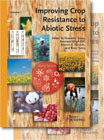
Improving crop resistance to abiotic stress
Tuteja, Narendra
Gill, Sarvajeet Singh
Tiburcio, Antonio F.
Tuteja, Renu
Abiotic stress, such as high salinity and drought is the most common challenge for sustainable food production in large parts of the world, in particular in emerging countries. The ongoing and expected global climate change will further increase these challenges in many areas, making improved stress resistanceof crops a key topic for the 21st century.Proteomics, genomics and metabolomics are methods allowing for the rapid and complete analysis of the complete physiology of crop plants. This knowledge in turn, is the prerequisite for improvements of crop resistance against abiotic stress through genetic engineering or traditional breeding methods.The latest update on improving crop resistanceagainst abiotic stress is presented by well-balanced international mix of contributors from industry and academia covering work done with individual crop plants, while also including studies of model organisms such as Arabidopsis that can then be applied to specific crop plants.From the contents:o Introduction into plant abiotic stress responseo Methods to improve plant abiotic stressresponseo Species specific case studiesThis multivolume reference work is a long awaited must-have for every scientist working in the fields of basic and applied crop science, plant physiology and plant biotechnology. INDICE: PrefaceForeword (G. S. Khush)Foreword (H. Hirt)Genetic modification of crops: Past, present and future (N. V. Fedoroff) Omics techniques in cropresearch: An overview (B. Fakrudin, R. Tuberosa and R. K Varshney)Translational biology approaches to improve abiotic stress tolerance in crops (R. Iannacone, F. Cellini, G. Morelli and I.Ruberti)Functional genomics of drought tolerance in crops: Engineering transcriptional regulators and pathways (B. Rathinasabapathi)Transcriptomic and metabolomic approaches to the analysis of plant freezing tolerance and cold acclimation (D. K. Hincha, C. Espinoza and E. Zuther)Molecular breeding for enhancing abiotic stress tolerance using halophytes (A. Parida, S. George and K. Kavita)Helicases in improving abiotic stress tolerance in crop plants (N. Tuteja, S. S. Gill and R. Tuteja) Cotton: genetic improvement for drought stress tolerance - current status and research needs (E. AbouKheir, M. S. Sheshshayee, T. G. Prasad and M. Udayakumar)Wheat: Functional genomics of abiotic stress tolerance (P. Khurana, H. Chauhan and N. Khurana)Rice: Genomics-assisted breeding for drought tolerance (P. Vikram, A. Kumar, A. Singh and N. K. Singh)Maize: Physiological and molecular approaches for improving drought tolerance (I. Singh, T. Nepolean, R. A. Rajendran and M. Shono)Barley: Omics approaches for abiotic stress tolerance (N. Pecchioni, J. A. Milc, M. Pasquariello and E. Francia)Sugarcane: Physiological and molecular approaches for improving abiotic stress tolerance and sustaining crop productivity (A.K.Shrivastava and S. Srivastava)Sunflower: Improving crop productivity and abiotic stress tolerance (C. A. Sala, M. Bulos, E. Altieri and M. L. Ramos)Sorghum: Improvement of abiotic stress tolerance (M. Dalal∗, M. Karthikeyan and V. Chinnusamy)Brassica crop species: Improving water use efficiency - challenges and opportunities ( C. D. Palmer, W. Keller, J. Singh and R. Datla) Generation and Scavenging of Reactive Oxygen Species in Plants under Stress (SarvajeetSingh Gill, Lamabam Peter Singh, Ritu Gill, and Narendra Tuteja)Understandingthe 'Commoneome? Operative in Plants in Response to Various Abiotic Stresses (Hemant R Kushwaha, Sneh L Singla-Pareek, Sudhir K Sopory, and Ashwani Pareek)
- ISBN: 978-3-527-32840-6
- Editorial: Wiley-VCH
- Encuadernacion: Cartoné
- Páginas: 1534
- Fecha Publicación: 14/03/2012
- Nº Volúmenes: 1
- Idioma: Inglés
